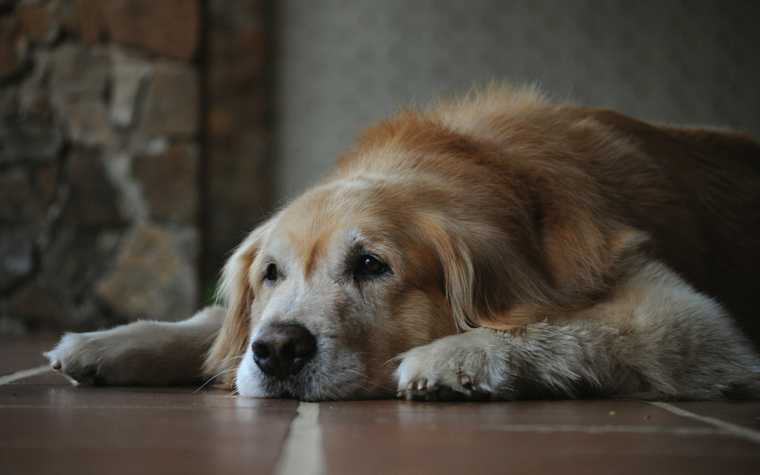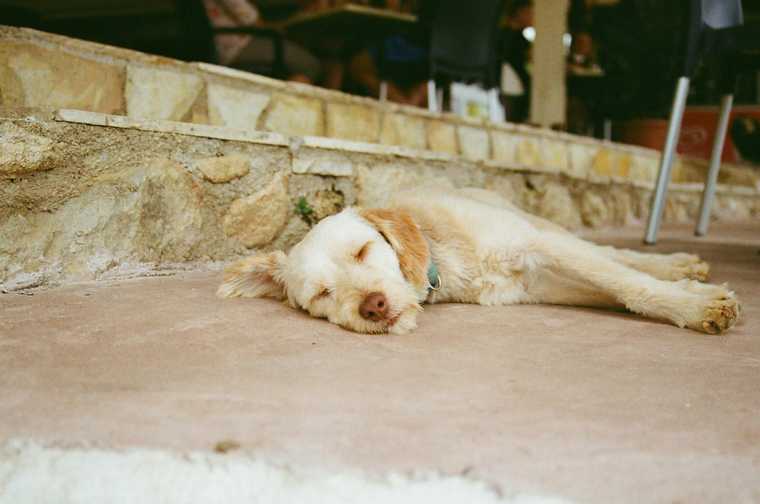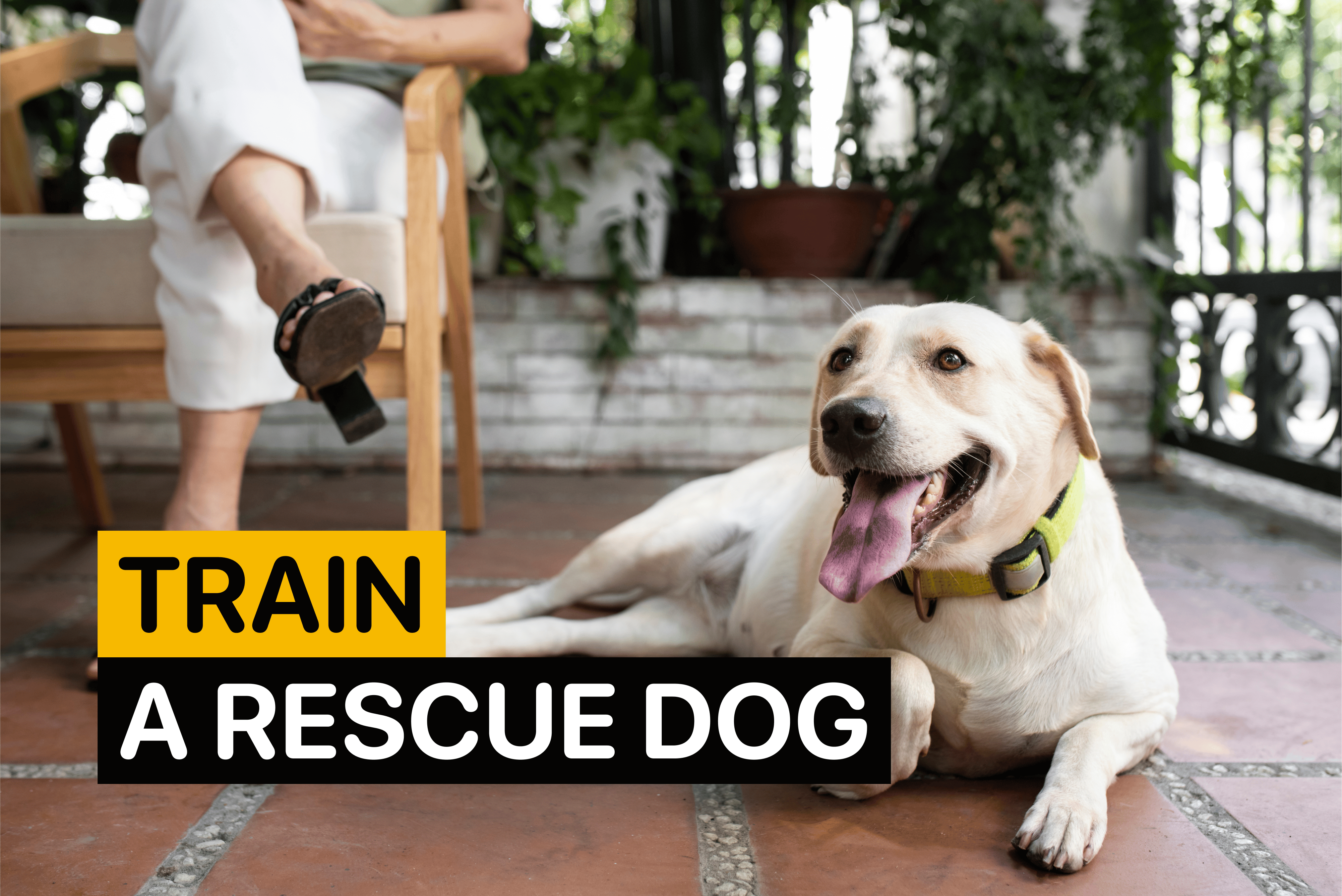Older Dog Peeing in Sleep: Common Causes and Fixes

By
Anastasiia Petrovska Updated on |Reviewed by
Karen PiwinskiAs a pet parent, you deal with both the good and the bad. It’s common for puppies to pee in their sleep. So when your senior dog is peeing in their sleep, it doesn’t mean you’re a bad parent. It’s a very common issue among dog owners. However, when these things happen, it can be confusing and alarming.
But there is some good news too! Most cases can be managed, and your pet can still enjoy life, even as they’re aging.
Key Takeaways
- A senior dog peeing while sleeping is a common issue caused by health issues
- A vet visit is essential to make a diagnosis and choose the right treatment
- Dog diapers and potty pads help to deal with the issue
- Frequent potty breaks improve bladder control
- Most older dogs can live comfortably with the right treatment and care.
This guide explains why your older dog is wetting the bed. We’ll also discuss what you can do to help your pet feel comfortable again.
Why Does an Old Dog Pee in Their Sleep
Having an older dog peeing while sleeping is more common than most dog parents think. Thus, when an older dog is peeing in their sleep, it’s usually for physical or medical reasons. Your dog isn’t doing it on purpose! It happens when bladder control is usually weakened or when they simply can’t hold it due to age.
Below are the most common causes of older dogs peeing while sleeping.

1. Urinary Incontinence
Urinary incontinence (UI) is among the top reasons elderly dogs peeing in their sleep can become a long-term issue. Dog incontinence is a condition characterized by bladder muscle weakness or bladder sphincter dysfunction. The following signs may suggest that your dog has urinary incontinence:
- The bed is damp in the morning
- There are dribbles of urine on the floor
- Fur around the hind legs is wet
- You’ve noticed your dog peeing in bed during naps.
Urinary incontinence isn’t bad behavior; it’s a medical disorder. Dogs don’t have the urge to pee, and the bladder simply empties on its own. As a result, most dogs may feel confused or stressed afterward. Thus, pet parents’ comforting attitude during unwanted accidents becomes crucial.
2. Medical Conditions
Medical issues are responsible for many cases of senior dogs peeing in bed. Many elderly dogs simply lose control of their bladder. They can also empty it unintentionally when the urinary tract is irritated.
Urinary Tract Infection (UTI)
A urinary tract infection, or UTI, is one of the reasons why an old dog pees in sleep. Experts say that sudden nighttime leakage happens because inflammation decreases the bladder’s ability to stay closed. Typical symptoms of a UTI include:
- Cloudy urine
- Strong-smelling urine
- Frequent urges to pee
- Constantly licking the genital area
- Whining when peeing.
Other symptoms may vary as UTIs can be caused by various issues, for example:
- Kidney disease
- Arthritis
- Dementia.
These are just a few examples of disorders that can cause a UTI. As soon as the infection is treated, a dog’s health improves, and urinary accidents happen less often.
Hormonal Imbalance (Estrogen Deficiency)
It’s a common cause of night peeing in spayed adult female dogs. But older dogs can suffer from it, too. Studies from veterinary journals show that nearly 3 to 20% of spayed female dogs experience urinary incontinence (UI). When levels of estrogen decrease, the urinary sphincter weakens. As a result, an older dog is peeing on the bed even without waking up.

What to Do If a Senior Dog Pees in Sleep
When you find out that your senior dog peed in sleep, it can feel overwhelming and stressful. But as a dog owner, you can help them feel safe and comfortable. Early intervention significantly improves outcomes and reduces stress for all household members.
Your senior dog may need new accommodations to help them continue potty in an appropriate place. At this age, they may need pee pads, more frequent potty breaks, and an area that is easy to clean where they feel comfortable in the case of accidents.
Below, you’ll find practical recommendations on how to deal with strategies backed by veterinarians and training experts.
1. Consult a Vet
If a senior dog is peeing on the bed, the first step should be to visit your vet. Many “wet” accidents during sleep are caused by a medical issue, not a behavioral one. Your veterinarian can perform a physical exam and run the tests, including:
- Urinalysis
- Blood tests
- Hormone testing
- Instrumental tests (ultrasound).
A veterinarian will help rule out other health conditions, such as diabetes, kidney disease, or dementia. Vet consultation is also crucial as it allows for timely diagnosis and proper treatment. For example, an antibiotic prescription for a UTI or hormonal medication for a hormonal imbalance. Additionally, your vet can consider other medications used for urinary incontinence. These drugs work by improving the muscle tone of the urethral sphincter.
Remember: The earlier you start the treatment, the more effective it can be. Don’t try to deal with the issue on your own, without a professional.
2. Use Potty Pads
Potty pads or pee pads have an absorbent layer protecting your dog’s sleeping area. When using pee pads, you can reduce the cleanup time. Incontinence pads can also help to deal with the dog’s urine odor and stains. It can also make sleep more comfortable for your dog. Consider reusable pads – these are especially useful.
3. Consider Dog Diapers
Dog diapers provide significant relief for both pets and their owners. These are ideal when an old dog pees in sleep regularly. The same as potty pads, these prevent wet fur and skin infections and keep the bed hygienic. Make sure to choose breathable diapers for nighttime, as they help avoid discomfort.
4. Provide Regular Bathroom Breaks
Senior dogs often need more frequent potty breaks, especially in the evening. Try to change your usual bedtime routine in the following way:
- Add one more potty break a few hours after dinner
- Introduce an additional bathroom break right before bedtime
- Put them in dog diapers in case you can’t organize a potty break at night
- Decrease water consumption before sleep, better 1 hour before bed (don’t restrict it excessively)
- You may add water to their kibble to decrease thirst at night.
Many dogs suffer from incontinence as they grow older. While it can be frustrating, taking them out as often as you can is crucial – while they’re still house trained, they are just struggling with their health in old age.
Frequent breaks are essential to decrease pressure on the bladder and reduce the chances of an old dog wetting the bed. You can also create a safe space for your dog so that they don’t pee all over the floor. For example, it can be a kitchen or a bedroom with gates or a crate. Enclosing the dog in such a “safe space” can guarantee the dog pees in a special place even when you sleep.
Wrap Up
When a senior dog pees in sleep, it might be upsetting and frustrating, but it’s also common and manageable. Carpet cleaners can help you get rid of the pee stains, and a gate will keep the dog from peeing elsewhere at night. Most cases are caused by medical issues, such as UTIs, hormonal imbalance, or urinary incontinence. With timely care and tools like dog diapers or dog pads, you and your dog can stay comfortable and enjoy life!
Remember: Your pet isn’t losing control because of bad behavior or laziness. They need your empathy as well as proper medical support. With the right care, treatment, and love, your senior dog can spend days with dignity and comfort.


